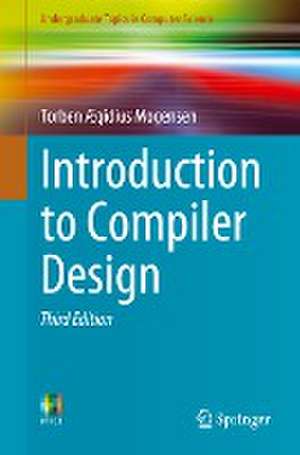Introduction to Compiler Design: Undergraduate Topics in Computer Science
Autor Torben Ægidius Mogensenen Limba Engleză Paperback – 6 ian 2024
All phases required for translating a high-level language to symbolic machine language are covered, and some techniques for optimising code are presented. Type checking and interpretation are also included.
Aiming to be neutral with respect to implementation languages, algorithms are mostly presented in pseudo code rather than in any specific language, but suggestions are in many places given for how these can be realised in different language paradigms.
Depending on how much of the material from the book is used, it is suitable for both undergraduate and graduate courses for introducing compiler design and implementation.
Din seria Undergraduate Topics in Computer Science
- 20%
 Preț: 304.13 lei
Preț: 304.13 lei - 20%
 Preț: 233.75 lei
Preț: 233.75 lei - 20%
 Preț: 350.89 lei
Preț: 350.89 lei - 20%
 Preț: 306.58 lei
Preț: 306.58 lei - 20%
 Preț: 187.22 lei
Preț: 187.22 lei - 20%
 Preț: 272.43 lei
Preț: 272.43 lei - 20%
 Preț: 280.93 lei
Preț: 280.93 lei - 20%
 Preț: 245.43 lei
Preț: 245.43 lei - 20%
 Preț: 305.61 lei
Preț: 305.61 lei - 20%
 Preț: 258.79 lei
Preț: 258.79 lei - 20%
 Preț: 376.76 lei
Preț: 376.76 lei - 20%
 Preț: 246.39 lei
Preț: 246.39 lei - 20%
 Preț: 336.99 lei
Preț: 336.99 lei - 20%
 Preț: 341.22 lei
Preț: 341.22 lei - 20%
 Preț: 192.73 lei
Preț: 192.73 lei - 20%
 Preț: 306.72 lei
Preț: 306.72 lei - 20%
 Preț: 384.11 lei
Preț: 384.11 lei - 20%
 Preț: 316.07 lei
Preț: 316.07 lei - 20%
 Preț: 374.37 lei
Preț: 374.37 lei - 20%
 Preț: 225.03 lei
Preț: 225.03 lei - 20%
 Preț: 226.65 lei
Preț: 226.65 lei - 20%
 Preț: 375.54 lei
Preț: 375.54 lei - 20%
 Preț: 395.05 lei
Preț: 395.05 lei - 20%
 Preț: 307.17 lei
Preț: 307.17 lei - 20%
 Preț: 254.37 lei
Preț: 254.37 lei -
 Preț: 334.89 lei
Preț: 334.89 lei - 20%
 Preț: 227.16 lei
Preț: 227.16 lei - 20%
 Preț: 304.37 lei
Preț: 304.37 lei - 20%
 Preț: 316.24 lei
Preț: 316.24 lei - 20%
 Preț: 287.03 lei
Preț: 287.03 lei - 20%
 Preț: 342.46 lei
Preț: 342.46 lei - 20%
 Preț: 276.82 lei
Preț: 276.82 lei - 20%
 Preț: 237.35 lei
Preț: 237.35 lei - 20%
 Preț: 374.20 lei
Preț: 374.20 lei - 20%
 Preț: 304.44 lei
Preț: 304.44 lei - 20%
 Preț: 297.28 lei
Preț: 297.28 lei - 20%
 Preț: 579.37 lei
Preț: 579.37 lei - 20%
 Preț: 298.18 lei
Preț: 298.18 lei - 20%
 Preț: 243.35 lei
Preț: 243.35 lei - 20%
 Preț: 302.80 lei
Preț: 302.80 lei - 20%
 Preț: 297.66 lei
Preț: 297.66 lei - 20%
 Preț: 300.89 lei
Preț: 300.89 lei - 20%
 Preț: 191.36 lei
Preț: 191.36 lei - 20%
 Preț: 278.11 lei
Preț: 278.11 lei - 20%
 Preț: 304.21 lei
Preț: 304.21 lei - 20%
 Preț: 389.96 lei
Preț: 389.96 lei
Preț: 316.03 lei
Preț vechi: 395.04 lei
-20% Nou
Puncte Express: 474
Preț estimativ în valută:
60.47€ • 64.67$ • 50.42£
60.47€ • 64.67$ • 50.42£
Carte tipărită la comandă
Livrare economică 14-19 aprilie
Preluare comenzi: 021 569.72.76
Specificații
ISBN-13: 9783031464591
ISBN-10: 3031464591
Pagini: 287
Ilustrații: XXII, 287 p. 139 illus.
Dimensiuni: 155 x 235 mm
Greutate: 0.57 kg
Ediția:3rd ed. 2024
Editura: Springer International Publishing
Colecția Springer
Seria Undergraduate Topics in Computer Science
Locul publicării:Cham, Switzerland
ISBN-10: 3031464591
Pagini: 287
Ilustrații: XXII, 287 p. 139 illus.
Dimensiuni: 155 x 235 mm
Greutate: 0.57 kg
Ediția:3rd ed. 2024
Editura: Springer International Publishing
Colecția Springer
Seria Undergraduate Topics in Computer Science
Locul publicării:Cham, Switzerland
Cuprins
Lexical analysis.- Syntax analysis.-Scopes and symbol tables.- Interpretation.- Type checking.-Intermediate-code generation.- Machine-code generation.- Register allocation.- Functions.- Data-flow analysis and optimisation.- Optimisation for loops.- More language features.- Set notation and concepts.- Index.
Notă biografică
The author has taught programming language design, implementation, and transformation at the University of Copenhagen for more than two decades.
Textul de pe ultima copertă
The third edition of this textbook has been fully revised and adds material about the SSA form, polymorphism, garbage collection, and pattern matching. It presents techniques for making realistic compilers for simple to intermediate-complexity programming languages. The techniques presented in the book are close to those used in professional compilers, albeit in places slightly simplified for presentation purposes. "Further reading" sections point to material about the full versions of the techniques.
All phases required for translating a high-level language to symbolic machine language are covered, and some techniques for optimising code are presented. Type checking and interpretation are also included.
Aiming to be neutral with respect to implementation languages, algorithms are mostly presented in pseudo code rather than in any specific language, but suggestions are in many places given for how these can be realised in different language paradigms.
Depending on how much of the material from the book is used, it is suitable for both undergraduate and graduate courses for introducing compiler design and implementation.
All phases required for translating a high-level language to symbolic machine language are covered, and some techniques for optimising code are presented. Type checking and interpretation are also included.
Aiming to be neutral with respect to implementation languages, algorithms are mostly presented in pseudo code rather than in any specific language, but suggestions are in many places given for how these can be realised in different language paradigms.
Depending on how much of the material from the book is used, it is suitable for both undergraduate and graduate courses for introducing compiler design and implementation.
Caracteristici
New topics include the SSA form, garbage collection, polymorphism and translation of pattern matching Some new examples have been added, and explanations have been clarified Uses RISC-V as the example target machine language
